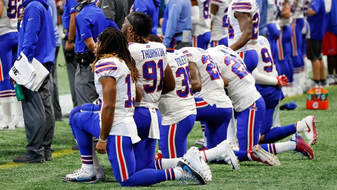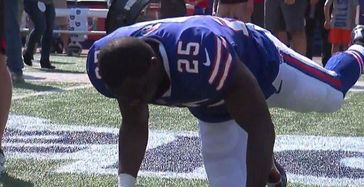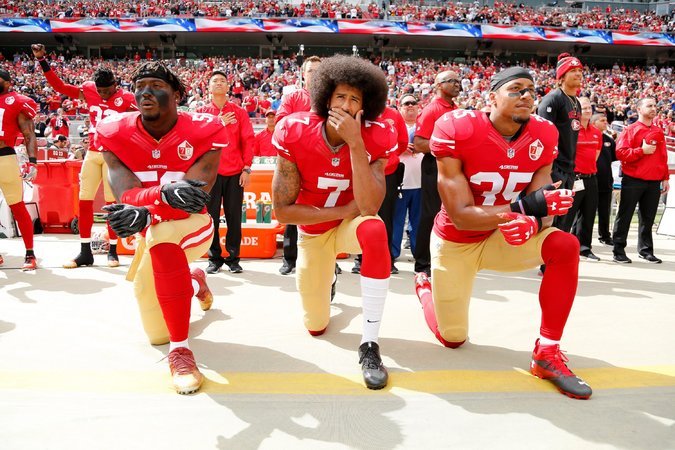"When Colin Kaepernick takes a knee, or Steph Curry says he does not want to go to White House, we feel as if we are being betrayed because we refuse to see black athletes as holistic individuals--only as extensions of our own civic pride and identity." -Kaila Cherry
This weekend saw the resurgence of athletes in the NFL as well as in the NBA and MLB demonstrating political resistance against the racial injustice and prejudice that has made itself all the more present recently in the United States. Over the past year, athletes who have taken their political stances into the game have been harshly criticized, most notably being ex-San Francisco 49ers quarterback Colin Kaepernick, who can be attributed with starting what has now become a movement last season. At this time last year, Kaepernick stopped standing for the National Anthem played before every game because he could not “...stand up to show pride in a flag for a country that oppresses black people and people of color.”
More recently, basketball star Steph Curry of the Golden State Warriors stated that he was “not interested” in going to the White House to celebrate his team’s victory in the NBA Finals, despite it being a traditional for winning teams.Curry’s statement caused President Trump to take to Twitter, resending Curry’s invite on Friday. Trump further antagonized the political actions of athletes the following day at a press conference in which he called players (specifically NFL players) who “disrespect” the American flag “sons of bitches” who should be “taken off of the field” and “fired.”

The President’s strong words led to the hashtag #TakeAKnee to trend on Saturday. The hashtag encouraged athletes to, just like Kaepernick, not stand for the national anthem in protest and solidarity. The next day, dozens of players kneeled and those who did not often linked arms in solidarity. The Houston Texans, the Green Bay Packers, and the Atlanta Falcons were some of the many teams that protested in this way. Other teams, such as the Seattle Seahawks, chose to stay in the locker room during the anthem. This only added to an already polarizing conversation that has gripped the nation for months: does politics belong in sports? However, the basis of this question implies its own bias--that sports and politics were ever separate to begin with.
To understand sports ties to politics, it is important to look at the trajectory of sports culture throughout the progression of American history. The four major sports today, football, basketball, baseball, and hockey, rose to prominence in the late 19th century as a response to the increased leisure time acquired by citizens due to the Industrial Revolution. With machines playing a bigger role in work efficiency, physical labor factored less and less into the daily experience.This free time translated itself into amatuer baseball teams and rugby games on college campuses. As sports culture rose in popularity at the turn of the 20th century, it did three essential things to minorities in this country. According to political activist and Fordham University professor Mark Naison, the rise of sports lent itself to the “... socializing and Americanizing immigrants and their children; its role in marginalizing African Americans in the Jim Crow era and then giving blacks a platform from which to challenge their subordination; and its shattering of gender norms on the field without eradicating the objectification of women in the sports marketplace.”
We see this phenomena persist throughout the latter of the 1900’s. When immigrants like Benny Leonard or Joe DiMaggio found their way to success through popular sports, they were able to shift the narrative around their identities and assimilate into the norms and values of the United States. Success in sports represented the American Dream: The idea that someone could come from nothing and with hard work and rugged drive, acquire the fortune they have always dreamed of. We can see Nelson's second point play out several times across many American sports, from boxers Jack Johnson and Muhammad Ali to baseball icon Jackie Robinson. Each victory in sports by a black American at the time was not merely a simple victory; it was symbolic of blacks taking power back from their oppressors. And to his third point, we watched women assert their athleticism in the second half of 20th century, with tennis player Billie Jean King breaking the glass ceiling by becoming the number one tennis player in the world.
We see this phenomena persist throughout the latter of the 1900’s. When immigrants like Benny Leonard or Joe DiMaggio found their way to success through popular sports, they were able to shift the narrative around their identities and assimilate into the norms and values of the United States. Success in sports represented the American Dream: The idea that someone could come from nothing and with hard work and rugged drive, acquire the fortune they have always dreamed of. We can see Nelson's second point play out several times across many American sports, from boxers Jack Johnson and Muhammad Ali to baseball icon Jackie Robinson. Each victory in sports by a black American at the time was not merely a simple victory; it was symbolic of blacks taking power back from their oppressors. And to his third point, we watched women assert their athleticism in the second half of 20th century, with tennis player Billie Jean King breaking the glass ceiling by becoming the number one tennis player in the world.
In this way, sports in America has been a direct response to the cultural zeitgeist of every era it has existed in. This is further expressed when we look at what caused sports in this country to become entwined with patriotism. Why is it that the national anthem is played before every major sporting event? The tradition is the result of World War 1. Back before the “Star Spangled Banner” was the official anthem of the United States, it was played at all special military occasions on the order of Woodrow Wilson. In the first game of the 1918 World Series, the Boston Red Sox and the Chicago Cubs stopped their game and turned to the American flag in the center of the field as the band broke into the “Star Spangled Banner.” The audience loved it. From that point onward, the song slowly began to the played at other sporting events. When the second World War gripped the nation, the “Star Spangled Banner” (now the official anthem for the United States) was played before and during games to increase morale and civic pride. After the war ended, the commissioner of the NFL ordered that the anthem be played before every single football game. “We must not drop it simply because the war is over.” he stated. “We should never forget what it stands for.”
What does all of this have to with today? After all, it is argued that we are in a post-racial society now. Black people, originally barred from major league sports entirely, now make up 70% of NFL players and 74% of the NBA players (In baseball, however, the number of black players is a staggering 8%). We also live in a time where we are supposedly able to separate politics from the various facets of our lives. We are not watching sports to hear about the news. When black athletes kneel for the national anthem to protest police brutality, many see them as stepping outside of their role. Sports is a form of entertainment, which, by association, makes athletes entertainers. We expect them to perform for us and disregard their blackness for our own sake. We are uncomfortable with black men, black entertainers, subverting the power dynamic.
Another argument against #TakeAKnee that fails to see the multiplicity of athletes’ identities is the idea that black athletes do not face oppression because of their wealth. The average NFL player makes $1.9 million a year, and this can increase depending on one’s position and importance on the field. What are they protesting for when they ultimately go home to multi-million dollar mansions, detached from the urban settings in which most police brutality against black men occurs? This idea streams from the false association that wealth takes precedence over race. Lebron James’ wealth did not save him from having the word “nigger” sprayed on the gate of his Los Angeles home earlier this year. As he said in a press conference soon after, “No matter how much money you have...being black in America is tough.”
As a nation, we turn athletes into myths of themselves. When they take the field, or take the court, they suddenly lose all other facets of themselves. In that moment, ball in hand, athletes, especially black athletes, become representations of strength, masculinity, success, and failure. They lose their realness. So when Colin Kaepernick takes a knee, or Steph Curry says he does not want to go to White House, we feel as if we are being betrayed because we refuse to see black athletes as holistic individuals--only as extensions of our own civic pride and identity.
This selfishness, this idea that black athletes exist only for our entertainment and pleasure, is representative of the problems they are protesting against. These players are not kneeling because they hate America and all it stands for. They are kneeling because they want to be acknowledged for more than just their sportsmanship. They want to be acknowledged and validated as black men. That is something that this country still fails to do.



